- What issues shape conflict and division?
- How are identities formed?
- What separates us?
Each semester groups of students work on projects to enhance community understanding regarding such questions including an English Language Learners partnership and a high school exchange in attempt to unite Seattle’s Public High Schools and establish a diverse community of youth leaders outside Roosevelt as well.
Our Roosevelt High School Teachers
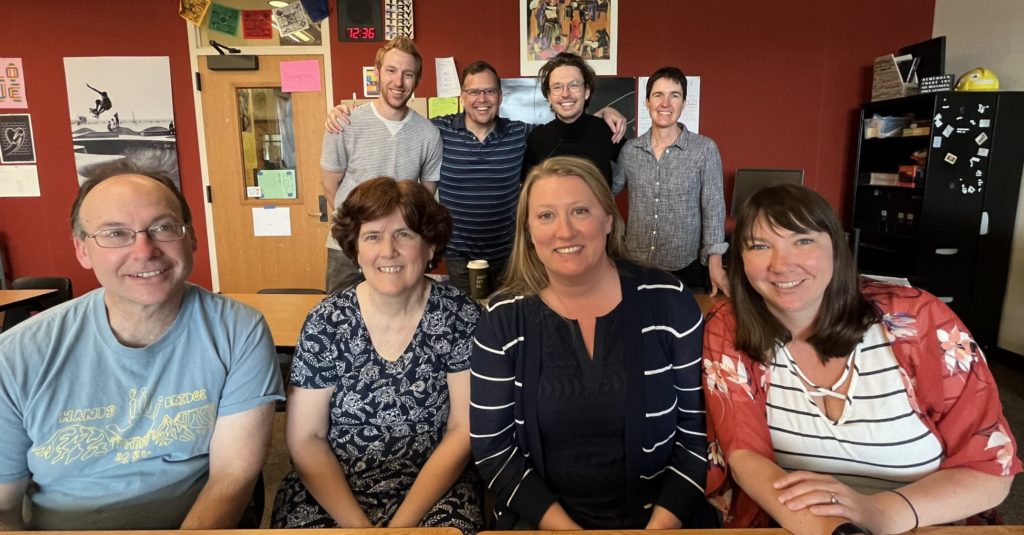
David Grosskopf
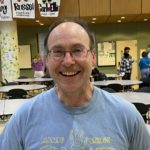 I have existed alongside Hands for a Bridge since its inception in 2001, appreciating its mission, enjoying my closest friendships with those involved, but keeping a firm distance from its many meetings and emotional and professional demands. When my daughter, Sophie, applied though, I had no hesitation at all: Sophie knew how to do school and was growing a solid understanding of history and global and local power dynamics; but HFB would explode her insular social world, move her into activism and leadership, carry her across the world to make those understandings of history and power vibrate on the strings of her heart. And HFB did these things. It activated her. It empowered a sense of herself and the needs of a broken but embracing world. When Sophie came back from South Africa, she was an enlarged spirit—stronger and sadder and in love with a place and a people half a world away. The next year, Tom Nolet could not travel to South Africa and everything conspired to bring me in. Over three years, I haunted Sophie’s steps but experienced my own towering thoughts about race, poverty, heroes, history and song. Every year has brought me closer to the work and the mission–investigating cultural and ethnic ruptures and what it means to be healing citizens that bridge pain and difference. And now I am so excited to be doing this work every day, with all those meetings and emotional demands, guided by a powerful cadre of adults on three continents, teaching and learning with a classroom of students drawn to a generation’s work and love.
I have existed alongside Hands for a Bridge since its inception in 2001, appreciating its mission, enjoying my closest friendships with those involved, but keeping a firm distance from its many meetings and emotional and professional demands. When my daughter, Sophie, applied though, I had no hesitation at all: Sophie knew how to do school and was growing a solid understanding of history and global and local power dynamics; but HFB would explode her insular social world, move her into activism and leadership, carry her across the world to make those understandings of history and power vibrate on the strings of her heart. And HFB did these things. It activated her. It empowered a sense of herself and the needs of a broken but embracing world. When Sophie came back from South Africa, she was an enlarged spirit—stronger and sadder and in love with a place and a people half a world away. The next year, Tom Nolet could not travel to South Africa and everything conspired to bring me in. Over three years, I haunted Sophie’s steps but experienced my own towering thoughts about race, poverty, heroes, history and song. Every year has brought me closer to the work and the mission–investigating cultural and ethnic ruptures and what it means to be healing citizens that bridge pain and difference. And now I am so excited to be doing this work every day, with all those meetings and emotional demands, guided by a powerful cadre of adults on three continents, teaching and learning with a classroom of students drawn to a generation’s work and love.
Barbara Burton
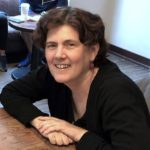 The highlights of my life have been the opportunities I have had to travel, study and share stories with those from other places and cultural contexts. I know that the best learning and growing can happen when we can leave our comfort zones, and immerse ourselves in other ways of life and different ways of seeing the world. For these reasons, I was very interested in being a part of this organization dedicated not only to travel but to building understanding of our shared humanity. Hands for a Bridge gives students a taste of how communities made up of diverse members can evolve and grow and then become essential to survival. Hands for a Bridge has also given me a chance to stay connected to colleagues who continue to challenge themselves, to curious students who want an adventure, and to a mission that is meaningful and consistent: we believe that the humanities — the stories, the poems, the songs, the philosophies — are the places where people can heal differences, and where our best hopes can be nurtured. So honored to be a part of this group.
The highlights of my life have been the opportunities I have had to travel, study and share stories with those from other places and cultural contexts. I know that the best learning and growing can happen when we can leave our comfort zones, and immerse ourselves in other ways of life and different ways of seeing the world. For these reasons, I was very interested in being a part of this organization dedicated not only to travel but to building understanding of our shared humanity. Hands for a Bridge gives students a taste of how communities made up of diverse members can evolve and grow and then become essential to survival. Hands for a Bridge has also given me a chance to stay connected to colleagues who continue to challenge themselves, to curious students who want an adventure, and to a mission that is meaningful and consistent: we believe that the humanities — the stories, the poems, the songs, the philosophies — are the places where people can heal differences, and where our best hopes can be nurtured. So honored to be a part of this group.
Carolyn Hall
HFB is meaningful to me as a teacher and as a person for so many reasons: It encourages honest dialogue across division, connects people across the globe, and promotes activism and social change. But what moves me, what makes me particularly passionate about the work it does, is what it does on the personal level. Through sheer time spent together, through challenging conversation and discussion of literature and creation of art, it shows young people that it is not just okay to be oneself, but that it is necessary to be oneself in order to truly “see” and “hear” another human being. I think HFB is about love—by learning to love ourselves, we learn to love others, too (and vice versa). And that is what will heal schools, cities, nations, and our world.
Kara Macdonald
Being involved in Hands for a Bridge is important to me because I value community. I joined HFB in 2008 as a new Social Studies teacher at Roosevelt. My experience building relationships with other teachers, at Roosevelt and our partner schools in Northern Ireland and South Africa, and with students has been incredibly valuable to me as a teacher and a learner. I love working with students as we set goals and intentions for ourselves and our community, providing a space for students to challenge themselves and support one another. Traveling to Northern Ireland and South Africa with students is challenging but the rewards are enormous as you watch students transform and put into practice the skills they have been working on throughout the year. Even more rewarding are the ripples that you see as students move forward in their lives demonstrating how HFB has impacted their choices of study, career and activism.
Michael Magidman
I am involved with HFB to cultivate dialogue. Honest, respectful, curious, and insightful dialogue leads infallibly to understanding, empathy, compassion, and peace. We badly need more complete dialogue in this world, and we all need to be better at it – including myself. Hands for a Bridge grows our capacity for dialogue: by forming our ability to express ourselves in a myriad of way, by developing our ability to listen, and by obliging us to have more questions than statements. Developing these skills is a lifelong pursuit. At some point we may feel that we have mastered these skills. At that same moment the news cycle interrupts our self-satisfaction and reminds us that there is much we still don’t understand, and still much we don’t know how to discuss. In continuing my own journey I am helping the students find their way. As the students find their way, they help me to continue my journey. Through this reciprocal process we are courageous together, vulnerable together, wise together, devastated together, and joyous together. Through our group experience we speak to one another; we listen to one another, and we heal one another. We learn to dialogue. That is why I am part of HFB – because in learning to dialogue the world ceases to be filled with creeds, ideologies, motives, and judgments. It begins again to be filled with people.
Kate Plesha
I have been keenly aware of the positive impact of Hands for a Bridge since I began teaching at Roosevelt in 2008. When the South African HFB students came to visit Roosevelt that year, I was helping in the vocal jazz classroom and they stopped by for an observation. I was awed by what transpired: both groups, connected by music decided to sing together – an improvisation. This coalescing of voices from opposite ends of the world, joined together in song despite cultural differences was what made me first love HFB. This program deeply impacts its surrounding communities, not just the students directly involved.
I officially joined the HFB teacher community in 2016 and am honored to learn and work alongside my colleagues. My travels with HFB to both Northern Ireland and South Africa have allowed me to see the true breadth of this amazing program. I am awed and humbled by the work that our students do while on these trips and their ability to make connections between the communities in which we travel and our own. HFB challenges all of us to put a mirror up to ourselves and do the hard work of change. I am eager to continue being a lifelong learner with Hands for a Bridge.
Paul Reese
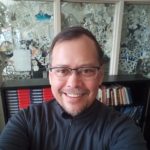 As a relatively new teacher to Roosevelt, being asked to chaperone Hands For a Bridge students to South Africa in 2018 was equally exciting and confusing. I had only a vague idea what HFB was. Unpacking the mission while simultaneously experiencing South Africa alongside HFB students and teachers was overwhelming and profound. As I watched Roosevelt students open their minds and hearts, I also grew in awareness, understanding and compassion. I realized how much I had to learn about South Africa and other places around the world where conflict and injustice persist in the context of long and complicated history. Alongside our students, I drew connections between South Africa and our own troubled story in the United States, including current social issues close to home. All of us were deeply touched by the honesty and emotional openness of our South African hosts, and experienced how reciprocal openness was an essential foundation for deeper understanding and empathy. We all returned as changed people. HFB continues to shape my growth as a concerned and active citizen of Seattle, the United States, and the world. It is a privilege to be part of the HFB community, to learn with and through it, and to contribute what I can.
As a relatively new teacher to Roosevelt, being asked to chaperone Hands For a Bridge students to South Africa in 2018 was equally exciting and confusing. I had only a vague idea what HFB was. Unpacking the mission while simultaneously experiencing South Africa alongside HFB students and teachers was overwhelming and profound. As I watched Roosevelt students open their minds and hearts, I also grew in awareness, understanding and compassion. I realized how much I had to learn about South Africa and other places around the world where conflict and injustice persist in the context of long and complicated history. Alongside our students, I drew connections between South Africa and our own troubled story in the United States, including current social issues close to home. All of us were deeply touched by the honesty and emotional openness of our South African hosts, and experienced how reciprocal openness was an essential foundation for deeper understanding and empathy. We all returned as changed people. HFB continues to shape my growth as a concerned and active citizen of Seattle, the United States, and the world. It is a privilege to be part of the HFB community, to learn with and through it, and to contribute what I can.
Our Isilimela Comprehensive School Teachers
Lihle Nkunzi
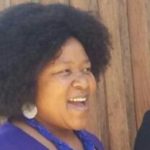
Siyabonga Gwexe
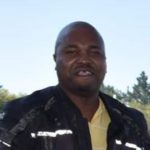 I joined HFB in 2015. It’s a unique programme that forges relationships between communities who in the past were segregated by the Apartheid system. HFB programme changed my mindset about different races.
I joined HFB in 2015. It’s a unique programme that forges relationships between communities who in the past were segregated by the Apartheid system. HFB programme changed my mindset about different races.
I am married with two kids and two dogs. I teach Maths and Mathematical Literacy in my school. I spend my Sunday mornings with a group of bikers (motorcycle) from different races. HFB prepared me to be able to have meaningful conversation with them.
I was born on the Eastern side of the country . . . and migrated to the Western side of the country to continue with my tertiary studies.
Pumza Mushanganyisi
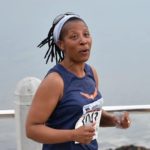 I’m from a family of four with two sisters and a brother. I live in Cape Town with my own family, husband and our four kids. I don’t have any pets.
I’m from a family of four with two sisters and a brother. I live in Cape Town with my own family, husband and our four kids. I don’t have any pets.
I studied at University of Western Cape. I have been working at Isilimela High School since 2003, teaching History. In 2015, I joined HFB.
I love running . . .
Our Bellville High School Teachers
Mandy Emery
When I first heard about HFB in 2005, I knew that this was a programme that we needed at my school, Bellville High. The programme offers the two HFB communities of Bellville and Isilimela the chance to live in each other’s worlds, something that we need so much in South Africa.
HFB has been and continues to be such an important part of my journey through this world and has connected me with some of the most inspirational people I know.
Lita Meyer
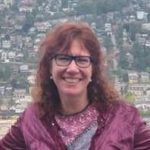 Teacher at Bellville High School in South Africa.
Teacher at Bellville High School in South Africa.
I teach Mathematics, have a keen interest in art and Hands For A Bridge is my passion. I’m married to Isak Meyer and I am a mother of three–John, Lilan and Eloise.
I would like to see change in the world, less corruption, people striving towards peace, people believing in themselves. Through HFB I am constantly learning and growing.
Our Oakgrove Integrated College Teachers
John Harkin
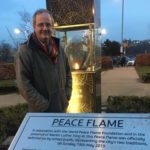
Mr. John Harkin is Vice Principal and English/Drama teacher at Oakgrove Integrated College in Derry/Londonderry, Northern Ireland. This school, the equivalent of an American combination middle/high school, is committed to the integration and honoring of historically divided Catholic/Protestant traditions in Northern Ireland. Mr. Harkin has welcomed Seattle teachers and learners to the school, city and province since 2007, plying us with sweets, tea and powerful conversations with local peacemakers. Mr. Harkin’s tireless work on behalf of his pupils and visitors has brought laughter, tears and learning to us all. Mr. Harkin truly embodies the Irish saying that, “It is in the shelter of others that the people live.” He has given us shelter, walked alongside us many miles as we listened and learned from those who have been affected by divisions and has embraced us with his healing smile and words. Mr. Harkin is the embodiment of Hands for a Bridge in our partner community of Northern Ireland.
Our Retired Teachers
Tom Nolet
Mr. Nolet, one of the co-founders of Hands for a Bridge, has co-led every trip to Cape Town, allowing years of SA travelers to start their days to the sounds of a harmonica, bridge the chasms all day long and finish with poetry and songs in their hearts. Mr. Nolet was the Language Arts Department Chair, and taught Language Arts at Roosevelt High School for 28 years. He was the instructor for the Hands for a Bridge class.
I often say a teacher is a revolutionary. It is the teacher’s responsibility to push boundaries, to create new approaches, to inspire students to view the world as a place worth cherishing and sustaining. Teachers are at their best when they do this together. My journey with Hands or a Bridge began in 2001. Together with fellow Roosevelt teachers Danny Rock and Francene Watson, we dared to collaborate on an idea that collapsed the classroom walls and opened the world as a learning arena. We did this as public school teachers – the teachers with the least amount of resource. We collaborated, we created, and what we generated yet endures.
Since our first journey in 2002, sixteen Roosevelt High School teachers have entered the HFB conversation, leading journeys to South Africa and Northern Ireland, guiding student conversation and artistic collaborations, forming working relationships with educators across the globe, engaging in fundraising to ensure equity in the formation of travel groups, designing itineraries for both traveling and visiting students and teachers, delivering and sharing deeply of themselves and their lives with their students. These are teachers who stirred the dust and lit the fires. They are my heroes.
Janine Magidman
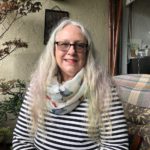 I am a teacher-member of HFB because I recognize that I am on my own, personal journey as a learner. I have found that the quest for understanding of any conflict, whether race in America and South Africa or identity and power in Northern Ireland, can only be viewed as a journey, not a destination. It is on that journey, that quest for understanding, that we grow and change. If I am willing to take on that quest and be enlightened in the process, then as a teacher I can only hope that I can take students with me on that journey. And that journey, for me and for students, is transformative. The journey bears the transformative power of person-to-person connections through art, music, dialogue, games and shared experiences. It carries the magic of the “aha” moment when we learn to be an empathetic ally. When we open ourselves to hearing the narratives of the complexities of human history we start to see that there is no “us” and no “them,” but only “WE.”
I am a teacher-member of HFB because I recognize that I am on my own, personal journey as a learner. I have found that the quest for understanding of any conflict, whether race in America and South Africa or identity and power in Northern Ireland, can only be viewed as a journey, not a destination. It is on that journey, that quest for understanding, that we grow and change. If I am willing to take on that quest and be enlightened in the process, then as a teacher I can only hope that I can take students with me on that journey. And that journey, for me and for students, is transformative. The journey bears the transformative power of person-to-person connections through art, music, dialogue, games and shared experiences. It carries the magic of the “aha” moment when we learn to be an empathetic ally. When we open ourselves to hearing the narratives of the complexities of human history we start to see that there is no “us” and no “them,” but only “WE.”